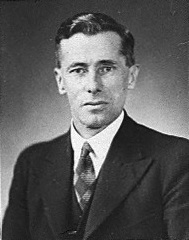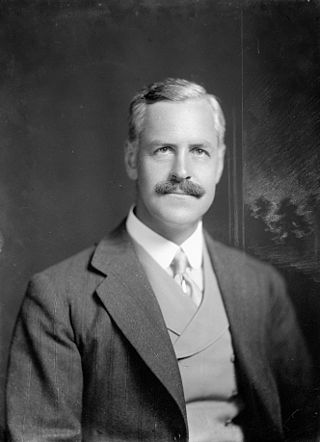
The 1984 New Zealand general election was a nationwide vote to determine the composition of the 41st New Zealand Parliament. It marked the beginning of the Fourth Labour Government, with David Lange's Labour Party defeating the long-serving Prime Minister, Robert Muldoon, of the National Party. It was also the last election in which the Social Credit Party won seats as an independent entity. The election was also the only one in which the New Zealand Party, a protest party, played any substantial role.

The 1943 New Zealand general election was a nationwide vote to determine the shape of the New Zealand Parliament's 27th term. With the onset of World War II, elections were initially postponed, but it was eventually decided to hold a general election in September 1943, around two years after it would normally have occurred. The election saw the governing Labour Party re-elected by a comfortable margin, although the party nevertheless lost considerable ground to the expanding National Party.
The Country Party of New Zealand was a political party which appealed to rural voters. It was represented in Parliament from 1928 to 1938. Its policies were a mixture of rural advocacy and social credit theory.

Joseph Gordon Coates served as the 21st prime minister of New Zealand from 1925 to 1928. He was the third successive Reform prime minister since 1912.

The 1911 New Zealand general election was held on Thursday, 7 and 14 December in the general electorates, and on Tuesday, 19 December in the Māori electorates to elect a total of 80 MPs to the 18th session of the New Zealand Parliament. A total number of 590,042 (83.5%) voters turned out to vote. In two seats there was only one candidate.

The 1925 New Zealand general election was held 4 November to elect a total of 80 MPs to the 22nd session of the New Zealand Parliament.
Port Waikato is a New Zealand parliamentary electorate which existed for four parliamentary terms from 1996 to 2008, and was recreated by the 2019/20 electoral redistribution ahead of the 2020 election. It was held by Bill Birch for one term, and by Paul Hutchison for the following three terms. From 2020, it was held by Andrew Bayly. All of these were members of the National Party.

Waikato is an electorate in the New Zealand Parliament. A Waikato electorate was first created in 1871 and an electorate by this name has existed from 1871 to 1963, 1969 to 1996, and 2008 to the present, though exact borders have often changed.
Raglan is a former New Zealand parliamentary electorate. It existed for three periods between 1861 and 1996 and during that time, it was represented by 13 Members of Parliament.

Robert Coulter was a New Zealand politician of the Labour Party.
Franklin was a rural New Zealand parliamentary electorate. It existed from 1861 to 1996 during four periods.

William Lee Martin, known as Lee Martin, was a New Zealand politician of the Labour Party.

Edward Arthur "Ben" Waters was a New Zealand rower who won two medals at the 1930 British Empire Games. He later unsuccessfully stood as a Labour parliamentary candidate at several elections.

The 22nd New Zealand Parliament was a term of the New Zealand Parliament. Its composition was determined by the 1925 election, and it sat until the 1928 election.

David Jones was a Reform Party Member of Parliament in the Canterbury region of New Zealand. In September 1931, he was appointed Minister of Agriculture and Minister of Mines in the United–Reform Coalition Government, but he was unexpectedly defeated in the December 1931 general election. He was a farmer and involved with many farming organisations, and was instrumental in forming the New Zealand Farmers Union, which eventually developed into Federated Farmers. Outside parliament, he was best known for his involvement with the New Zealand Meat Producers Board, of which he was the inaugural chairman, and which he chaired for more than a decade.

The 1917 Bay of Islands by-election was a by-election held on 19 March 1917 during the 19th New Zealand Parliament in the Northland electorate of Bay of Islands. The by-election came about because Vernon Reed's win in the 1914 general election had been declared void by an electoral court, and Reed barred from standing for a year. The seat was won by William Stewart, Reed's Reform Party colleague, in the resulting 1915 by-election. When Reed became eligible again, Stewart resigned and Reed won the 1917 by-election unopposed.

The Hamilton by-election 1959 was a by-election held in the Hamilton electorate in Hamilton in the Waikato during the term of the 32nd New Zealand Parliament, on 2 May 1959.

The 1936 Manukau by-election was a by-election during the 25th New Zealand Parliament in the Manukau electorate. It was held on Wednesday 30 September 1936. This by-election came about because of the resignation of Bill Jordan upon his appointment to the position of High Commissioner to the UK during the term of the 25th New Zealand Parliament. The by-election in the Manukau electorate was contested by Arthur Osborne for Labour and Frederick Doidge for National, with Osborne winning the election.
The 1942 Hauraki by-election was a by-election for the electorate of Hauraki held during the 26th New Zealand Parliament.















